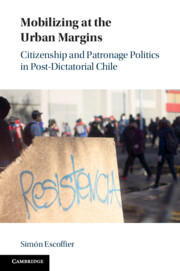Book contents
- Mobilizing at the Urban Margins
- Mobilizing at the Urban Margins
- Copyright page
- Contents
- Figures and Tables
- Acknowledgments
- Abbreviations and Acronyms
- Terms
- Introduction
- 1 The Mobilizational Citizenship Framework
- 2 The History of Mobilization in Chile’s Urban Settings
- 3 The Demobilization of the Urban Margins
- 4 Memory of Subversion
- 5 We, the Informal Urban Dwellers
- 6 Protagonism and Community-Building
- Conclusion
- Book part
- References
- Index
4 - Memory of Subversion
Published online by Cambridge University Press: 25 May 2023
- Mobilizing at the Urban Margins
- Mobilizing at the Urban Margins
- Copyright page
- Contents
- Figures and Tables
- Acknowledgments
- Abbreviations and Acronyms
- Terms
- Introduction
- 1 The Mobilizational Citizenship Framework
- 2 The History of Mobilization in Chile’s Urban Settings
- 3 The Demobilization of the Urban Margins
- 4 Memory of Subversion
- 5 We, the Informal Urban Dwellers
- 6 Protagonism and Community-Building
- Conclusion
- Book part
- References
- Index
Summary
This chapter focuses on the case of Lo Hermida, a neighborhood in which mobilization has endured since Chile’s democratic transition. The chapter explains how memory-building prepares the ground for the emergence of mobilizational citizenship in Chile’s urban margins. It begins by delivering a historical account of how radical movements socialized young urban dwellers in some neighborhoods during the anti-dictatorial protests in the 1980s. This contextual information is key to understanding the development of mobilizational citizenship in Chile’s urban margins. By providing political training to neighborhood dwellers, radical groups and parties on the left ensured historical continuity between the present construction of identity and the past, pre-coup insurgent project of mobilization at the urban margins. The chapter then explores how activists develop agency in the present through memory-building. This is accomplished by using memories of successful collective action to performatively subvert oppressive past events. The chapter shows how activists carry out this subversion through their interactions, idealizations of past radical groups, and repertoires of contention.
- Type
- Chapter
- Information
- Mobilizing at the Urban MarginsCitizenship and Patronage Politics in Post-Dictatorial Chile, pp. 124 - 144Publisher: Cambridge University PressPrint publication year: 2023

